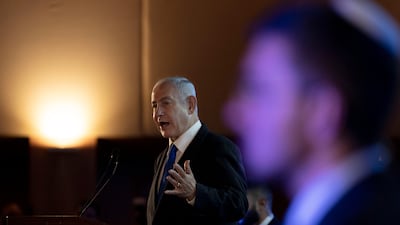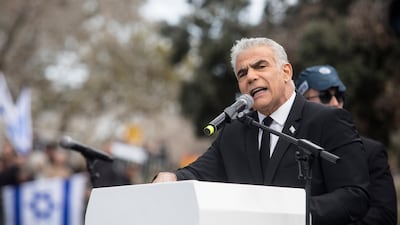Israel's Prime Minister Benjamin Netanyahu on Sunday sought to allay mounting concern over a policy agenda that has divided Israelis and alarmed allies in the two months since his government was installed.
“We are one people, with one destiny, with one country, one faith … if you’re waiting for civil war, it ain’t going to happen,” Mr Netanyahu said in a speech at the annual Jerusalem gathering of the Conference of Presidents of Major American Jewish Organisations.
Israelis have staged weekly protests across the country to oppose his government's proposed reforms of the judicial system, which have also alarmed key allies including the US.
The overhaul includes a new “override clause” that would allow parliament to relegislate — by simple majority — laws that the Supreme Court rejects, and give the government control over the selection of judges.
On Thursday, US ambassador to Israel Tom Nides said the Biden administration had told Mr Netanyahu to “pump the brakes. Slow down, try to get a consensus, bring the parties together” on the reforms.
Members of Mr Netanyahu's government condemned the remarks, with Diaspora Minister Amichai Chikli telling the ambassador to “put the brakes on yourself and mind your own business”.
Mr Nides later clarified his comments, saying: “I didn’t say put the brakes on, I said pump the brakes … I’m not involved in how Israelis pick their Supreme Court.”
Mr Netanyahu adopted a more diplomatic tone in his speech on Sunday.
“Israel is a democracy and will remain a democracy, with majority rule and proper safeguards for civil liberties,” he said.
“All democracies should respect the will of other free peoples, just like we respect their democratic decisions.”
But a recent poll by Israel's Channel 12 found that only one in four Israelis supported the judicial reforms. And on Saturday, tens of thousands of Israelis turned out for a seventh consecutive weekend to protest against the move. A general strike called last Monday, when the legislation was tabled in parliament, was one of the biggest in the country’s history.
Thousands of protesters were expected to gather in Jerusalem's political district once again on Monday as the Knesset — Israel's parliament — convenes to vote on the plan.
President Isaac Herzog, who is attempting to mediate on the issue between the ruling right-wing coalition and opposition parties, issued another call for compromise on Sunday and suggested the matter could settled “in a matter of days”.
However, any compromise would embarrass the new government and further alienate extreme-right members of the cabinet, many of whom put judicial reform at the heart of their manifestos.
Mr Netanyahu on Sunday also reaffirmed other priorities for his time in office, saying that the government was working on a peace deal with Saudi Arabia, boosted by a series of vast infrastructure projects.
He described the potential deal as a “quantum leap ending Israeli-Arab, not Palestinian, conflict”.
He also spoke of his growing concern over Iran edging closer to making a nuclear weapon.
International Atomic Energy Agency inspectors in Sunday revealed that Tehran was just short of enriching uranium to the threshold needed for a nuclear bomb.













